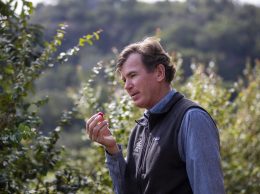It was around noontime and Camarillo dentist Dr. Mark Lisagor was 8,000 miles from Ventura County, lying on his back receiving acupuncture treatments at a clinic in Kathmandu, Nepal.
“I was on the ground floor in an old building. Everything was shaking and people started to just run out the door,” he said.
A few hundred feet away, inside the clinic, a brick wall collapsed and killed the people sitting below. When he escaped the building, crowds of people had run out of neighboring structures and were gathered in the street. They had just escaped a 7.8 magnitude earthquake that ultimately killed more than 7,000, devastating the economy of one of the world’s poorest countries.
“Everyone was in a bit of shock, just not knowing what to do,” he said.
A UCLA-trained dentist and longtime volunteer in lesser developed countries, Lisagor was on a trip with an organization called Global Dental Relief. He had arrived four days prior and was preparing the clinic where he and 14 other volunteers were expected to do dental work on 2,000 needy children.
His team — five dentists, three dental hygienists and six other volunteers from three different countries — had arrived just the day before and were sightseeing at nearby historical sites in Patan Durbar Square, many of which were destroyed. Fortunately all were safe and were able to fly out a week later.
“They were probably some of the last people to take pictures of those buildings before they collapsed,” he said.
While Lisagor and his group were about 50 miles from the epicenter, he said the jolts of the earthquake felt stronger than anything he’d experienced in Southern California. He said it felt 10 times stronger than the 1994 Northridge earthquake that killed 57 people.
“This still felt stronger than any of the California ones I’ve experienced,” he said.
The earthquake had destroyed the building for his team’s dental clinic “to the point where we couldn’t go in or even think about running our dental clinic this year.”
As Lisagor and his volunteer team regrouped at a shut-down hotel, the full devastation of the disaster further set in as they struggled to figure out how to help.
Many of the children in nearby boarding schools were orphaned as many of them have families living in the remote villages of the Himalayas, where issues of poverty and child slavery and prostitution persist.
“Children were finding out they’d lost their parents,” he said. “In the remote regions of Kathmandu, there’s issues of poverty and even starvation… and lots of children don’t make it to age 5. So sometimes the parents will figure out how to get their children to be in the boarding schools outside the villages.”
Lisagor and his group began visiting and donating toys to the children at a nearby boarding school, where 200 were huddled under tarps on the playground since buildings were still too unsafe to go inside. More than 100 aftershocks occurred throughout the following week.
The director of that same school, which is run by a large Buddhist monastery and assists the efforts of Global Dental Relief, is now struggling to keep the school running and provide shelter to the children.
“Right now the director doesn’t know if she’s going to be able to keep the school or what to do with all these kids,” Lisagor said.
The school is currently sending relief efforts to the destroyed villages, while major organizations such as Red Cross and UNICEF are struggling to get supplies and food to crucial areas due to layers of government bureaucracy and other technical issues, according to Lisagor. He said native organizations such as the school, called Thrangu Rinpoche’s School for Himalayan Children, are “so much better positioned to hit the ground running and get into these remote areas.”
“They just don’t have all the resources to get by,” he added. “That’s a good place to donate because the money will do well. I think that’s the best way to get dollars to go further and work more efficiently.”
Beyond the efforts of the Nepali school and other organizations in the area, Lisagor said the devastation of the earthquake was accompanied by an outpouring of support among local communities.
“I was totally overwhelmed by the amount of gentle kindness the Nepali people were showing us and each other,” he said. “People were taking care of people, of strangers.”
Lisagor has been running dental practices in Oxnard and Camarillo for more than 35 years and has been working with Global Dental Relief for 10 years. He has been retired for four years but continues to lead four to five volunteer teams in areas such as Nepal, northern India and Guatemala each year.
“I’ve been on or led one of these trips over 50 times and this is one I’ll never forget,” he said.
— To donate, visit http://himalayanchildren.org






 Print
Print Email
Email

















